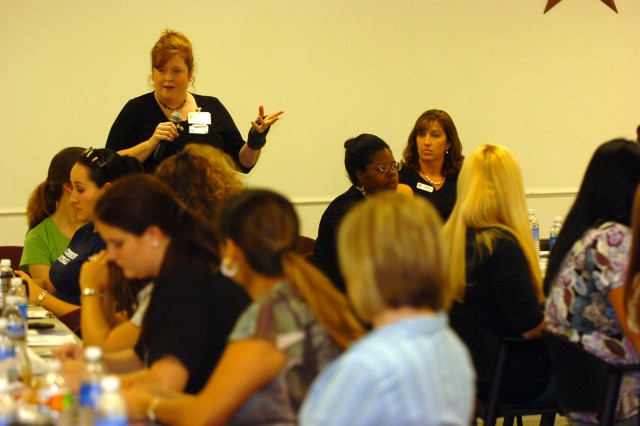FORT HOOD, Texas - Although a reunion is a happy time, it can also bring considerable stress - stress Families and service members may not expect.
Family members from the 1st Cavalry Division's, 3rd Heavy Brigade Combat Team, came together for the Greywolf Family Challenge Workshop on Oct. 15-17 at Fort Hood's Oveta Culp Hobby Soldier & Family Readiness Center. The workshop informed spouses on what to expect and how to prepare for their Families for their reunion with their loved ones.
Even if a service member has been called up before, they may find that new challenges will arise with each reunion. In order to make the homecoming event as happy as possible, it helps to know what kinds of challenges they might face and if their expectations are realistic.
Expect things are going to be different - and that isn't a bad thing, said Leann Volesky, a 3rd HBCT senior spouse.
"Families, especially Families that are going through their first deployment have to guard against expectations. They have to find a new normal in which they can exist...their old normal is gone," Volesky said.
"Communicate...communicate...communicate, it's all about keeping the lines of communication open," stressed Volesky. "If he (your Soldier) comes home and rearranges your silverware, it's OK to let him know I kind of like my silverware the way it was. You don't need to keep things bottled up and be upset that they're doing something you might not like, and he needs to talk to you also."
When Soldiers have been away for an extended deployment they and Family members have almost predictably changed during that time.
At one point in the open discussion with the spouses, Tamara Preece, married to Spc. John Preece, an Armor crewman, deployed with D Company, 3-8 Cav., said this is their first deployment; however they expected their Family to be fine when they are reunited.
"I think making the transition from being with his friends and the Soldiers in his unit to being with his Family will take patience," said Preece, from El Centro, Calif. "It will take time for our Family to readjust to our new life together. When my husband left our daughter (Autumn) was just an infant, now she is walking and talking, but he still wants her to be that baby that he never got to spend time with."
According to 'Retuning from the War Zone' a publication distributed by the Department of Veteran Affairs, children may also have a difficult time adjusting and may have a lot of questions.
Children should be prepared for the returning service member. Kids may have different needs now. They might take awhile to warm up to the service member, especially if they were very young when the service member left.
Parents should continue with their current routines, discipline and activities, and slowly integrate the service member back into their child's life.
Lori Carpenter, the FRG leader for 3rd HBCT, said Family members shouldn't leave any of the workshops feeling as if they're going at it alone, whether it's their first deployment or their third or fourth deployment.
Carpenter, from Bennington, Vt., encouraged all of the spouses and their Soldiers to communicate and use all the resources available to them.
"There are a lot of different agencies available here on post to provide support for our Families before and after their reunion with their loved ones, everybody from Family Advocacy program, Military Child Coalition to Behavior Health services, from Soldiers who have had experiences downrange coming back to our Families," Carpenter said. "Don't be afraid or ashamed to call on any of these agencies if there is a situation that warrants it."
Maj. Charles Jack, 3rd Heavy Brigade Combat Team Battalion, 1st Cavalry Division's Rear Detachment commander, summed up the first day with a final comment: "Families and Soldiers will have to take the time and patience to have a successful reunion. Through communication and compromise they can make the adjustment to their new lives...their new normal."




Social Sharing